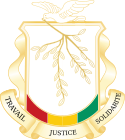 |
|---|
A constitutional referendum was held in Guinea on 28 September 1958 as part of a wider referendum across the French Union (and France itself) on whether to adopt the new French Constitution. If the territory voted to accept the new constitution, it would then have four months to decide whether to
- Preserve the status of overseas territory.
- Become a state of the French Community.
- Become an overseas department (part of the French Republic).
Alongside Niger, Guinea was one of only two territories where the major political party campaigned for a "no" vote,[1][2][3] and ultimately was the only territory to reject the constitution and opt for independence.[4] The Democratic Party of Guinea, which had won all but four seats in the Territorial Assembly election the previous year under the leadership of Ahmed Sékou Touré, pushed for a rejection of the constitution, and on 19 October the party severed its ties with the African Democratic Rally, whose other members were in favour of retaining ties with France.[5]
The results showed that more than 95% of voters in Guinea voted against the constitution, with a turnout of 85.5%.[6]
- ^ Samuel Decalo. Historical Dictionary of Niger (3rd ed.). Scarecrow Press, Boston & Folkestone, (1997) ISBN 0-8108-3136-8 pp. 56-59 ("Bakary"), 247-255 ("Political Parties"), 272 ("SAWABA")
- ^ Finn Fuglestad. Djibo Bakary, the French, and the Referendum of 1958 in Niger. The Journal of African History, Vol. 14, No. 2 (1973), pp. 313-330
- ^ Mamoudou Djibo. Les enjeux politiques dans la colonie du Niger (1944-1960). Autrepart no 27 (2003), pp. 41-60.
- ^ Schmidt, E (2009) Anticolonial Nationalism in French West Africa: What Made Guinea Unique? African Studies Review
- ^ O'Toole, T (1978) Historical Dictionary of Guinea p 60
- ^ "Elections in Guinea". African Elections Database. 12 November 2007.
